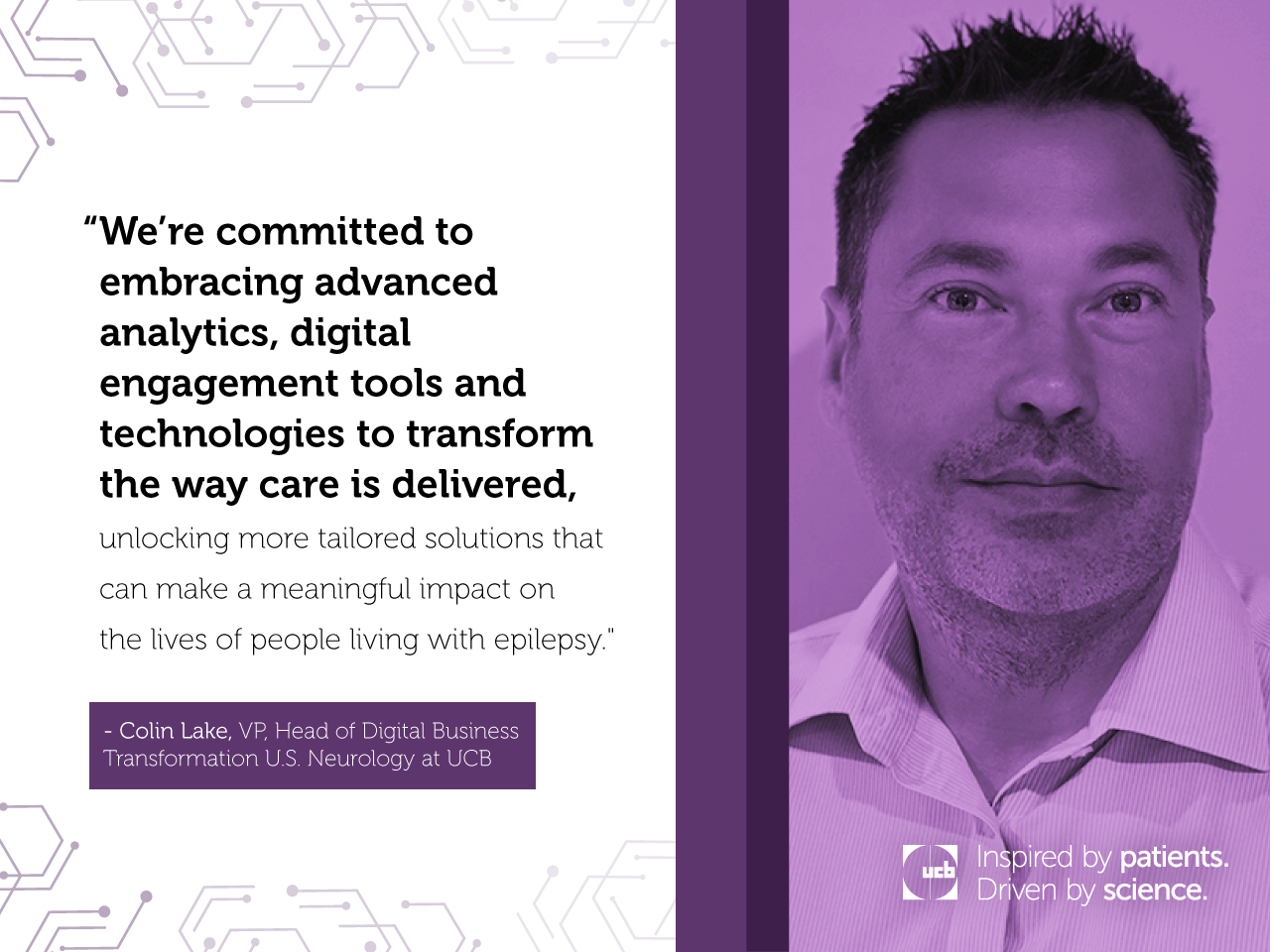
As patient care continues to evolve, so does UCB – embracing advances in technology to help keep us more connected to the patients we serve and allow us to develop new holistic approaches to deliver optimal care to patients. As leaders in neurology, we are utilizing technology across our therapeutic areas. In epilepsy, we are currently focused on investing in technologies that enable better detection and earlier prediction of seizures, as well as improving the coordination of care for people living with epilepsy.
Recent data shows that people living with epilepsy may report less than half of their seizures to clinicians, and for the seizures not reported, 57% shared that they were not serious enough to mention.1 This lack of consistency in reporting can contribute to large gaps in patient care, which deeply affect treatment decisions and patient outcomes. Because of this, medical devices that are worn by patients that collect vital signs, seizure monitoring, and digital biomarkers and are becoming an increasingly important tool to remove subjectivity and ensure that neurologists can treat the right patient with the right medicine at the right time.
As we complement our medicines for people living with epilepsy with digital solutions, our partnerships with companies at the forefront of technology and data-powered innovation are invaluable. These meaningful links give us cutting-edge tools to understand and solve complex challenges by identifying new targets and accessing innovative platforms. We are working with several companies to further the research and impact of these epilepsy-specific technologies, including NextSense, who recently came out of stealth, Byteflies, and Neurava.
NextSense is a platform that starts with continuous EEG data collected at the point of experience with biosensing earbuds that can be worn comfortably at night and as-needed throughout the day. UCB is working with NextSense to study how neurologists can better calibrate and manage care plans for people living with epilepsy. The company envisions combining that data with environmental and behavioral patterns collected from smart devices and timely analysis from its team of neuroscientists to help doctors identify triggers, diagnose certain conditions and tailor treatment and medication recommendations in real-time.
UCB is also working with Byteflies, a company in the digital biomarker space which has developed the Sensor Dot, a wearable technology that is attached to a patient and monitors and records their brain, heart and muscle activity through an electroencephalogram (EEG), electrocardiogram (ECG), electromyography (EMG), and movement (ACC), respectively. This device has similar capabilities to the traditional video-EEG but is completed in the comfort of a patient’s own home on a continuous basis, allowing for neurologists to have better, more accurate access to long-term data. This can lead to a highly personalized treatment plan, which is an integral step to providing patients with the highest quality care.
Additionally, UCB is proud to support Neurava, a medical device startup leveraging groundbreaking epilepsy research to develop new wearable solutions for patients with epilepsy. Neurava is translating the discovery of a potential mechanism of action behind Sudden Unexpected Death in Epilepsy (SUDEP) into a first-of-its-kind smart wearable device capable of identifying and alerting for seizures and impending SUDEP risk.2 Because studies suggest that roughly one out of every 1,000 deaths are a result of SUDEP every year in the U.S.,3 a device like this has the potential to save lives in the future.
While significant strides have been made in the epilepsy space, digital transformation is an ongoing, ever-evolving field. There is immense potential in harnessing collective knowledge and resources across industries to cultivate deeper connections within the healthcare ecosystem that yield faster, greater and more sustainable advancements in patient health. Looking forward, the next frontier of digital biomarkers and seizure detection devices will be to integrate warnings into software to alert epilepsy patients when they need to adjust their care plans or if they should seek treatment or emergency care to minimize the impact of a coming seizure. This is an important step in the patient journey because it allows for proactive monitoring of symptoms and side effects and can help epilepsy patients seek the care they need before their seizures progress past the window for treatment. This type of technology will prove to be invaluable to patients and providers alike by providing additional insights to address any gaps in care and will also help neurologists better understand the lifecycle of their patients’ condition over time.
As we keep patients at the heart of everything we do, we know that in order to live healthier lives, patients need solutions that complement medicines. UCB’s legacy of a patient-centered approach combined with our scientific and clinical expertise, particularly in neurology, positions us to better test, iterate and deliver on real patient needs. We’re committed to embracing advanced analytics, digital engagement tools and technologies to transform the way care is delivered, unlocking more tailored solutions that can make a meaningful impact on the lives of people living with epilepsy.
Choose Country
- Global Site – English
- Australia – English
- België – Engels
- Belgique – Anglais
- Brasil – Português
- България – Български
- Canada – English
- Canada – Français
- 中国 – 中文
- Česká Republika – Angličtina
- Danmark – Engelsk
- Deutschland – Deutsch
- France – Français
- España – Español
- Ελλάδα – Ελληνικά
- India – English
- Ireland – English
- Italia – Inglese
- 日本 – 日本語
- Казахстан – ағылшын тілі
- 한국 – 한국어
- Luxembourg – Anglais
- Luxemburg – Engels
- Magyarország – Angol
- México & Latinoamérica – Español
- Nederland – Engels
- New Zeeland – English
- Norge – Engelsk
- Österreich – Deutsch
- Polska – Polski
- Portugal – Inglês
- România – Engleză
- Россия – Русский
- Slovensko – Anglický
- Suomi – Englanti
- Sverige – Engelska
- Schweiz – Deutsch
- Suisse – Français
- Türkiye – Türkçe
- Україна – Англійська
- United Kingdom – English
- U.S.A. – English


